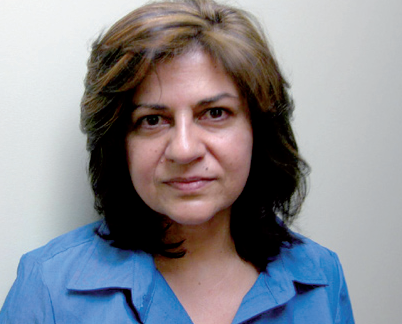 Women’s Worldwide Web interviews Yanar Mohammed, Founder and President of OWFI (The Organization of Women’s Freedom in Iraq).
Women’s Worldwide Web interviews Yanar Mohammed, Founder and President of OWFI (The Organization of Women’s Freedom in Iraq).
In 1993, Yanar Mohammed left Iraq and headed for Canada with a promise: to return and give back to her country. Ten years later, she was able to honor her promise. In April 2003, Yanar hung up the sign for the newly-formed Organization of Women’s Freedom in Iraq (OWFI) in an office of an abandoned bank in central Baghdad. This was to be Yanar’s base of operations in her struggle to defend those who have paid the highest price of Iraq’s many wars: women and their children.
Since 2003, women’s conditions in Iraq have deteriorated dramatically. Violence—already endemic under the Saddam Hussein regime—peaked following the 2003 invasion. In their households and on the streets of Iraq, women and young girls were the most vulnerable individuals, the primary victims in a country devastated by unemployment and sectarian strife. War widows were forced to turn to prostitution. Women and girls found themselves exposed to exacerbated domestic violence and honor killings.
OWFI works to protect women from violence, honor killings, sex trafficking, and prostitution. Today, almost a hundred OWFI activists run different programs in Baghdad: providing shelters for women and conducting on-the-ground research and advocacy work; a Women’s Prisons Watch programme, which monitors women’s conditions in the prisons of Baghdad; and their own radio station, Al Mousawat Radio, which together with the organization’s newspaper (also called Al Mousawat), serves as a crucial platform to raise awareness and discuss women’s conditions in Iraq. OWFI organizes advocacy campaigns both in Iraq and abroad (including the UK, Canada and Sweden).
In an interview with Women’s Worldwide Web, Yanar Mohammed, discusses the history of the Organization of Women’s Freedom in Iraq, the organization’s inspiration and achievements and the challenges it faces.
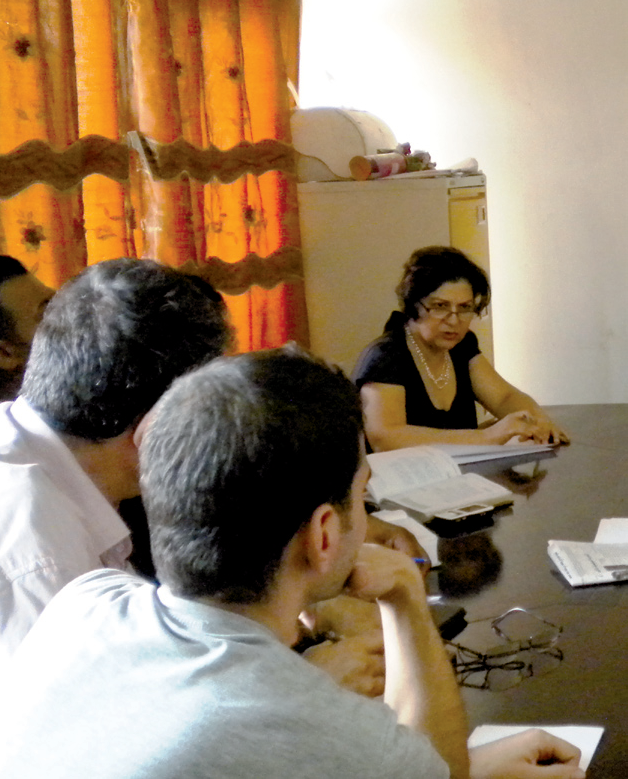 1. How did you come to create the Organization of Women’s Freedom in Iraq?
1. How did you come to create the Organization of Women’s Freedom in Iraq?
In 1995, I Ieft Iraq and emigrated to Canada. When I left Iraq, I was broken inside. I wanted to do something with my life and come back to this country strengthened. At the start of the US invasion in 2003, some politically engaged friends and I had the idea of founding an organization. I was deeply distressed, knowing that girls were being kidnapped on the street. The decision to found an organization was immediate: the streets were not safe for girls and women anymore; something had to be done.
It’s a very simple story, really: I was overwhelmed by the need for intiqam (needing to act to correct an injustice). My friends and I came together and found a room in a bank in Baghdad that had been abandoned after an explosion. There, I hung up the organization’s sign.
We had a long debate about our name. Some proposed “the Organization of Women’s Liberation”. But “liberation” felt too political. Eventually, we decided to use the word “freedom”. The “Organization of Women’s Freedom in Iraq” was founded during May and June of 2003. At the beginning, there were just two of us. By the time of our meeting in September 2003, we had around 60 members.
2. In your opinion, how have the status and conditions of Iraqi women changed since the invasion of Iraq in 2003?
At the moment of the US invasion we harboured some hope for an improvement in women’s rights in Iraq. Just yesterday, I was remembering these hopes while rereading UN resolution 1325, adopted by the Security Council in 2000, dwelling on what the resolution lays out as the fundamental steps towards women’s empowerment.
The resolution emphasizes, first of all, that women should be part of the decision making process. However, since 2003, we have instead witnessed a real marginalization of women in decision-making processes. Thanks to the efforts of Americans (and some of their Iraqi allies), women in the political arena now make up 25% of the political arena, but I have never seen any of these women fighting for women’s rights. These women claim to represent women’s interests, but, in my opinion, they do not at all.
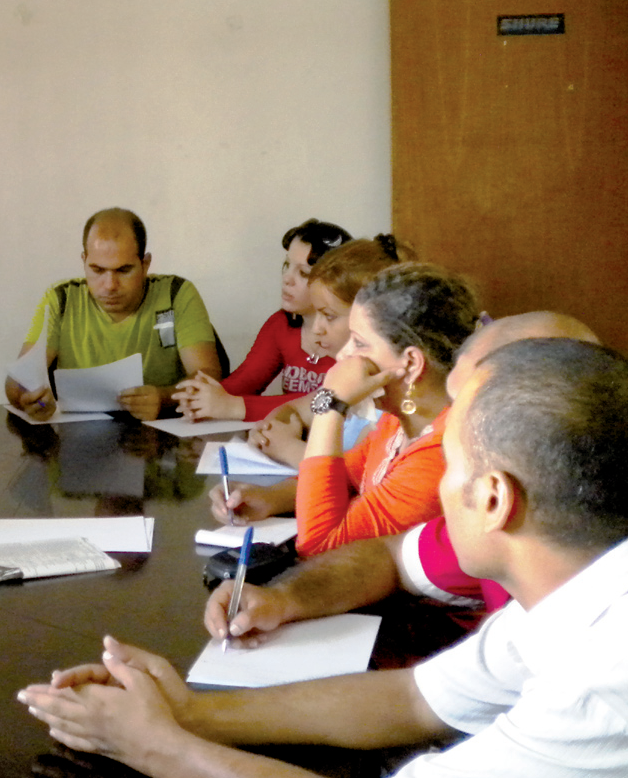 The resolution’s second fundamental point is that women need to be adequately protected. In 2003, girls started to be kidnapped in the streets. At the very beginning, we did not understand that these events were related to one another and were part of a serious “trend” that we needed to deal with and fight against. The trafficking of women always increases in places where there is no government. And kidnapping was happening all over Iraq. The numbers—which increased into the thousands—were frightening. And nobody was being held accountable. In this context, protection for women was lost. In 2003, we organized a demonstration in one of the main squares of Baghdad, during the Paul Bremer mandate, asking for protection for the women of Iraq.
The resolution’s second fundamental point is that women need to be adequately protected. In 2003, girls started to be kidnapped in the streets. At the very beginning, we did not understand that these events were related to one another and were part of a serious “trend” that we needed to deal with and fight against. The trafficking of women always increases in places where there is no government. And kidnapping was happening all over Iraq. The numbers—which increased into the thousands—were frightening. And nobody was being held accountable. In this context, protection for women was lost. In 2003, we organized a demonstration in one of the main squares of Baghdad, during the Paul Bremer mandate, asking for protection for the women of Iraq.
The worst phase for women was between 2007 and 2008, especially in south Iraq, around Basra. There, mutilated corpses of women were found in the streets. Many women were killed by sectarian militias or vigilantes. These women had been judged as promiscuous and untraditional and then mutilated and killed. Yet these crimes against women were the actions of religious militias and speaking out against the religious militias was taboo.
You cannot imagine how many enemies you can make when you speak out about this, denouncing what is going on. Those committing these murders were stoking a religious fever. Many people, when I spoke out about what was going on, asked me: “Why do you want to go against your culture?” Others called me “prejudiced” because I was speaking about religion.
In these moments you have little support and you gather many enemies. I was blacklisted in many places, and my work was discredited by many female policy-makers, who tend to support change within religious parameters. In this situation, I found myself alone, completely alone, as a secular feminist.
3. Does the situation of women in the Kurdistan region differ from that of women in the rest of Iraq?
In Iraqi Kurdistan the practice of female genital mutilation is very common, much more so than in the rest of the country. I would say that in certain areas of Kurdistan almost 80% of women have undergone this practice. And in Iraqi Kurdistan—a region that is often presented as an “oasis of democracy” in Iraq—honor killings are very common. Many women also commit suicide by burning themselves, under pressure from their families, when they have been accused of behaving in a dishonorable way.
But honor killings are also very common in the South, and very easy to commit. It is enough for someone merely to have doubts about a girl or a woman: then they can start to denounce her. This is a tribal practice. Close to Nassirya, 500 kilometers southwest of Baghdad, people bring their women (who have been accused of being dishonorable) and choke them to death. They bury these women under the sand. Sometimes they even bury them alive, covered with a small amount of sand, and leave them to be eaten by wolves during the night. Witnessing these events, I felt I had to reveal to the whole world what was happening, to speak out about these crimes against women. My colleagues and I investigated and documented these incidents, which were unimaginably ugly. In order to act effectively, we had to try to face these things rationally; we had to try not to be too emotional. Otherwise, our sadness was overwhelming and we had to be strong in the face of vehement criticisms; we were denounced for betraying societal and religious tradition.
4. What inspires and sustains you in your courageous and relentless work to defend women’s rights?
Three main things have kept me going. First, the circle of feminists around the world who share the conviction that all women should be free, equal to men, and able to exercise their human rights.
Second, my secular egalitarian friends and local supporters in Iraq who struggle on a daily basis to make Iraq a better place. They are not just women: men also write to me to tell me that they dream of the day when their daughters will be able to live freely in a different Iraq.
And, finally, I am sustained by my personal conviction that this is my cause. I will not rest in peace until there are better conditions for women, and for the whole of Iraqi society.
5. OWFI works to protect women from and prostitution, and also to protect the rights of women prisoners (Women’s Prisons Watch). Can you please tell us about the actions of OWFI in these areas and about the women’s shelters run by OWFI?
OWFI has three main projects. The first is our work to defend women’s rights and stop violence against women. OWFI conducts research and reports on these issues in order to raise awareness about the violation of women’s rights and advocate for change. OWFI also runs women’s shelters to help women who have been the victims of violence, rape, and/or sex trafficking.
The second project is the Women’s/Egalitarian Media Program. This program addresses both women and men: indeed, it is extremely important to speak to men, who (as fathers, husbands, government officials, etc.) are sometimes in a stronger position to change the situation and improve conditions for Iraqi women. It is also very important to talk to young people. Young people in Iraq want to live in freedom. Our radio program addresses, for example, the young women and men of Sadr City, a southern suburb of Baghdad, known as the headquarters of the sectarian group led by Muqtada al Sadr. Even there, we have our supporters; our radio is an outlet for many of the disenchanted youth in that area. Our radio station, Al Mousawat Radio, and our newspaper, also called Al Mousawa, are thriving.
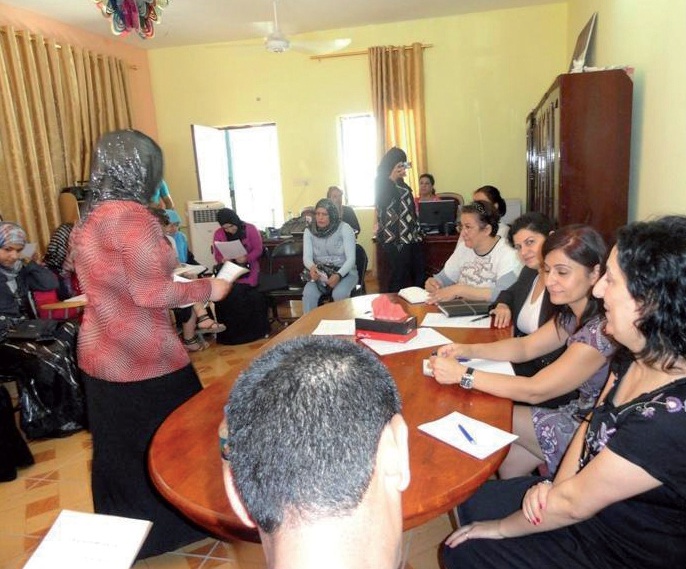 We have many live radio shows, during which young women bring up issues they want to discuss. For example, a woman can speak out about the fact that she was the victim of harassment while she was using public transport. In general, we discuss women’s daily issues and challenges. We also have a youth show, on which we discuss (often with irony or sarcasm) the sectarian division in Iraq.
We have many live radio shows, during which young women bring up issues they want to discuss. For example, a woman can speak out about the fact that she was the victim of harassment while she was using public transport. In general, we discuss women’s daily issues and challenges. We also have a youth show, on which we discuss (often with irony or sarcasm) the sectarian division in Iraq.
80% of our audience is under 30 years of age, and 60% of our audience is male. However, it would be hard to define their ideological affiliations. The young people who make up our audience simply want to practice their freedom.
The third component of our work is our Women’s Prisons Watch. We document what happens in women’s prisons and try to improve the women’s situations and tell their stories. We have conducted a program in Kadhimiya prison, in Syfor prison, and in the juvenile prisons where young girls are detained.
The Abu Ghraib scandal opened our eyes to the tragic and widespread abuse of women in Iraqi prisons. Many women came forward in Kadhimiya prison and told us that they had been raped during detainment and we began documenting and reporting on these cases. We have been campaigning to help women on death row, to put an end to the abuse of women in prison and to improve their situation.
The stories of the young women and children in the juvenile prisons are heartbreaking. I discovered that almost half the girls in the juvenile prison are there as a result of a “prostitution verdict”.
In one of the juvenile prisons in Baghdad we met two twelve-year-old girls (I would rather call them “babies”). They were sisters. I asked them: “What brings you here?” They answered: “prostitution.” But how can a twelve-year-old girl decide to prostitute herself? It turned out that they had been sold through trafficking networks. When I saw them, I just wanted to embrace them, as if they were my daughters. This is one story always in my mind, but sadly, there are many stories like this one.
6. Can you tell us about the advocacy work of OWFI (harnessing media such as Al Mousawat newspaper and radio) and the impact of OWFI’s campaigns to protect women’s rights and improve women’s conditions in Iraqi Kurdistan and the rest of the country?
The latest issue of Al Mousawat had a print run of 3,000 copies. The copies ran out in two weeks. We clearly need to be printing more! And we have a lot of success with the radio.
A growing number of people want to be identified with our organization, including a broad base of youths who are tired of a fundamentalist government in Iraq.
In spite of the backlash in Iraq since 2003, there is a call for change in Iraqi society. Today, we have hundreds of active supporters and thousands (approximately 50,000) of inactive supporters. There is a growing awareness and support of our work to defend women’s rights and we believe that progress in the domain of women’s rights lies at the core of wider societal progress.
7. What are the main challenges you have faced since establishing OWFI?
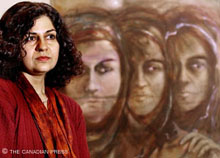 The main challenge for me during the first year were the death threats made against me. I still remember the first time. I was sitting in a public Internet café, because at that time it was very difficult to get an Internet connection in Baghdad. I opened my inbox and there was an email entitled “Killing Yanar within days”.
The main challenge for me during the first year were the death threats made against me. I still remember the first time. I was sitting in a public Internet café, because at that time it was very difficult to get an Internet connection in Baghdad. I opened my inbox and there was an email entitled “Killing Yanar within days”.
A second difficult moment came in 2006, when a bomb exploded in the street just beside our headquarters, when we were in the middle of a meeting. Women were terrified, suddenly faced with the risk of death. At a moment like this, you understand how fragile human existence can be.
Of course, we have always faced more routine challenges, such as limited mobility because of snipers and months where we didn’t have a penny. Because of funding issues, as well as the constant threat of militias, we have had to move our main shelter from one place to another.
Finally, like many other engaged women, I have the challenge of responding to my family duties, trying to find the right balance between my engagement and the time I dedicate to my family.
8. Can you share with us a particularly memorable achievement (or achievements) in your work with OWFI?
The story of Intisar is a moving example. Intisar is a young Iraqi girl, very beautiful. She eloped with her lover and they had a baby — an act that is usually punished, in traditional families, by so-called honor killing.
Intisar’s family looked for her everywhere. Dalal, an activist in our organization, mediated the situation. Dalal told the family that there was a man who was willing to marry Intisar (in fact referring to the man that Intisar had already married).
We brought everyone together: Intisar, Intisar’s parents, and the man with whom Intisar had run away. We presented the man to the family, assuring them that he is a good man. I remember the expression on Intisar’s face, as she looked at her father, from whom she had run away. And this story—one that would usually end with a knife in Intisar’s neck—had a happy ending, because Intisar’s father finally agreed to the marriage. At that moment, Intisar’s mother started kissing my hand; the father shook hands with me and Dalal and he kissed his daughter.
Intisar’s mother gave her a 25-dinar note and Intisar’s father wanted to give me and Dalal 25 thousand dinars. We accepted the money and said that with this money, we would buy a beautiful wedding dress for Intisar. Although Intisar was in reality already married, she deserved to have a marriage celebration, with a beautiful dress, like all other brides.
There we all were together and we were all dressed differently: I was wearing jeans; Dalal and Intisar were wearing modern Iraqi clothes; Intisar’s mother was wearing traditional dress and her father the Sheik headdress. We were all in tears, witnessing the birth of a woman instead of the death of a woman. This, thanks to our organization. This happened last March (2010).
9. What are your plans for OWFI? What are your organization’s most pressing current and future needs, enabling you to move forward with your work effectively?
Our main problems are, these days, financial. We need to mobilize financial resources in order to maintain our “oasis of freedom,” our newspaper, our radio and women’s shelters. We also need help in the form of governmental and moral support. Until now, the government has campaigned against us.
Our plan for 2011 is to establish committees in every city in Iraq.
10. Looking forward, what do you consider the preconditions for improving women’s lives in Iraq?
Legislation needs to be changed; the constitution is based on Islamic Sharia law and this is detrimental to women’s rights.
Also NGO workers need to be free to do their work on the ground. The government is not supportive of our work. On the contrary, we have to struggle to overcome practical obstacles to do our work on a daily basis, not to mention the undermining criticism of our work to defend women’s rights.
11. How can people who wish to support the work of OWFI get involved?
People can get involved by making editorial contributions to our website, “Equality in Iraq,” or to our magazine and radio station. Our website also has a “donation button”, through which people can offer financial support. At times, we have gladly hosted visiting volunteers, but security issues at the moment are making this more and more difficult.
12. What would your message of inspiration for women in Iraq today be?
I would say “equality”. “Equality” is a sacred word. Human beings are sacred and nothing should stand in the way of human beings living together peacefully: not religion, nor ethnicity. I would also say “freedom”: freedom on our own terms, not on anyone else’s terms.
Interview conducted by Maria Fantappie
© Women’s WorldWide Web 2011













